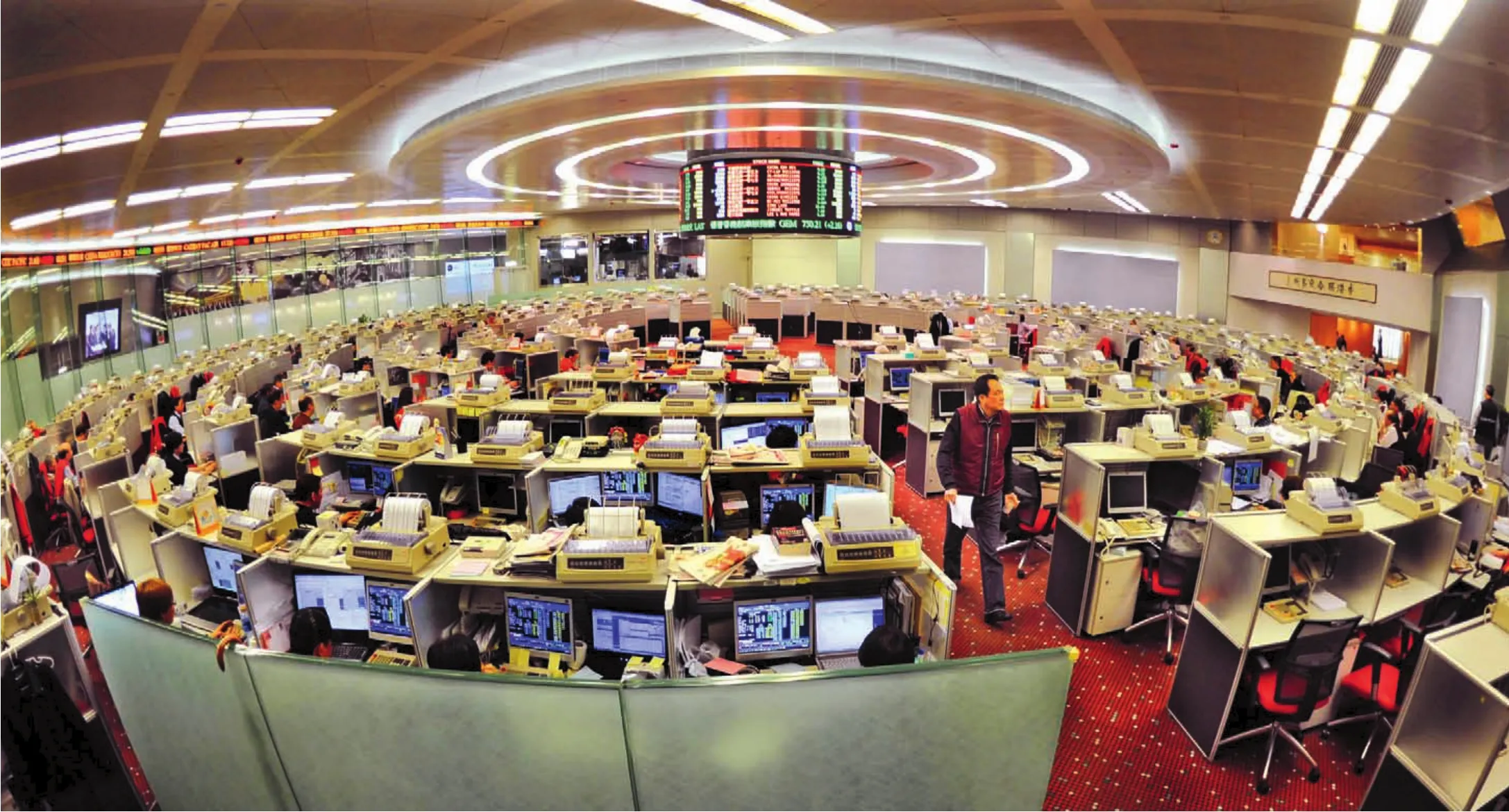A Step Further Toa Global Yuan
2012-10-14ByLanXinzhen
By Lan Xinzhen
A Step Further Toa Global Yuan
By Lan Xinzhen
China allow s yuan funds in Hong Kong to invest in mainland securities market

FINANCIAL HUB: Hong Kong Exchanges and Clearing Ltd. extended its business hours in 2011 to keep c loser ties w ith m ain land m arkets
T he renminbi qualified foreign institutional investor program, known as RQFII,has established a new mechanism for the backflow of overseas yuan funds.
The China Secu rities Regu lato ry Comm ission (CSRC), the People’s Bank of China (PBOC) and the State Adm inistration of Foreign Exchange (SAFE) jointly issued rules for the pilot program of RQFII on December 16, 2011, giving a green light to qualified Hong Kong subsidiaries of fund management companies and securities companies to use yuan funds raised in Hong Kong to directly invest in the mainland bond and equity markets through the RQFII quota.
An analysis report of the Research Center of the Investment Bank Department of the Industrial and Commercial Bank of China said to enhance the status of the yuan in the international market, it is of great significance to set up two mechanisms—one is allow ing the yuan to circulate in the overseas market,and the other is the backflow.
The creation of the RQFII is an important step forward for the internationalization of the Chinese currency, said the report.
The RQFII is also an important link connecting the mainland and Hong Kong capital markets, and is a channel for cooperation between the two markets.
Tian Yong, an analyst w ith CASH Financial Services Group, said the RQFII m ight make the Chinese currency more attractive to overseas holders.
Tria l laun ch
The pilot program of RQFII is proceeding as planned. The SAFE on January 30 disclosed a document concerning the distribution of RQFII quotas.
Nine fund management companies and 12 securities companies, all based in Hong Kong, shared the prelim inary 20-billion-yuan($3.05-billion) quota.
To ensure the sound proceeding of the program, the authorities chose to start w ith Hong Kong subsidiaries of fund management companies and securities companies which are supposed to be more fam iliar w ith the mainland capital market.
According to the program, to control risks, qualified investors should invest no less than 80 percent of the yuan funds they raised in fixed-income securities, while investment in stocks and equity funds should account for no more than 20 percent.
It is estimated that after one to three months, overseas yuan funds w ill be able to invest in the mainland securities market.
A fter getting the RQFII quota, some fund management companies have reported their plans for designing the products.
The first RQFII product is called RMB Bondplus Fund, and will be raised and operated by the China Universal Asset Management Co. Ltd. It w ill be distributed through major banks in Hong Kong. Its initial offering price is 10 yuan ($1.53) per unit and subscription fee charges are up to 5 percent. Retail investors can subscribe to Class A shares w ith an initial subscription amount of 10,000 yuan($1,530), and that of an institutional investor is 3 million yuan ($458,000).
The supervision of the RQFII will be very strict as it is a new financial business for China.
According to the rules, the CSRC is responsible for overseeing the securities investment activities of the pilot institutions,the central bank—the PBOC—manages the RQFIIs’ renminbi bank accounts opened on the mainland, SAFE controls the investment quota,and the PBOC and SAFE jointly monitor and manage the inflow and outflow of capital.
New channe l
RQFII is conducive to increasing the yield of overseas yuan funds, said analysts.
Li Xunlei, chief econom ist w ith Guotai Junan Securities, said the yield of overseas yuan funds in Hong Kong is very low. The deposit interest rate of the yuan is around 0.6-0.7 percent. The yield of other overseas yuandenominated bond funds is about 1-2 percent.
Compared w ith the low yield in overseas markets, the one-year deposit interest rate on the mainland stands as high as 3.5 percent. Li said the RQFII is sure to bring more benefi t for yuan investors in Hong Kong.
M ore importantly, as Hong Kong is a major international financial center, overseas investors can invest in the Chinese mainland capital market through the RQFII.
The new rules said the RQFII can invest in inter-bank bond markets, while under the previous qualified foreign institutional investor (QFII) program, QFIIs were not allowed to invest in domestic inter-bank bond markets.
The new rules make the RQFII more attractive to overseas capital, as overseas yuan holders can participate in the mainland financial market to get higher returns.
The RQFII is also good new s for the mainland’s A share market as it w ill bring in more capital. Last year, the mainland stock market plunged and has affected the launch of new IPOs. The RQFII is just in time to rescue the deteriorating A share market.
But in the short term, the RQFII will have little influence on the mainland stock market, as the majority of RQFIIs can only be invested in fixedincome products, and no more than 4 billion yuan ($610.69 million) can be invested in stocks and equity funds, which is small compared w ith the 16-trillion-yuan ($2.44-trillion) market value of the A share market.
Fu tu re exp ansion
Hong Kong’s yuan assets are more than willing to enter the mainland market because the deposit interest rate of the yuan in Hong Kong is much lower than that of the mainland, and the investment channel is very limited.
But the fi rst approved RQFII quota is only equivalent to 3 percent of the yuan deposits in Hong Kong.
Figures from the Hong Kong Monetary Authority showed that by the end of November 2011 the yuan deposits in Hong Kong exceeded 620 billion yuan ($94.66 billion).
On January 16 at the Asian Financial Forum held in Hong Kong, Yao Gang, Vice Chairman of CSRC, said the CSRC is considering expanding the quotas.
It’s reported that the CSRC may be increasing the quota by another 50 billion yuan($7.63 billion), which will be managed separately from the 20-billion-yuan quota.
Li said considering the amount of yuan funds in Hong Kong, RQFII has a huge market in the future and might exert a real effect on the mainland securities market.
